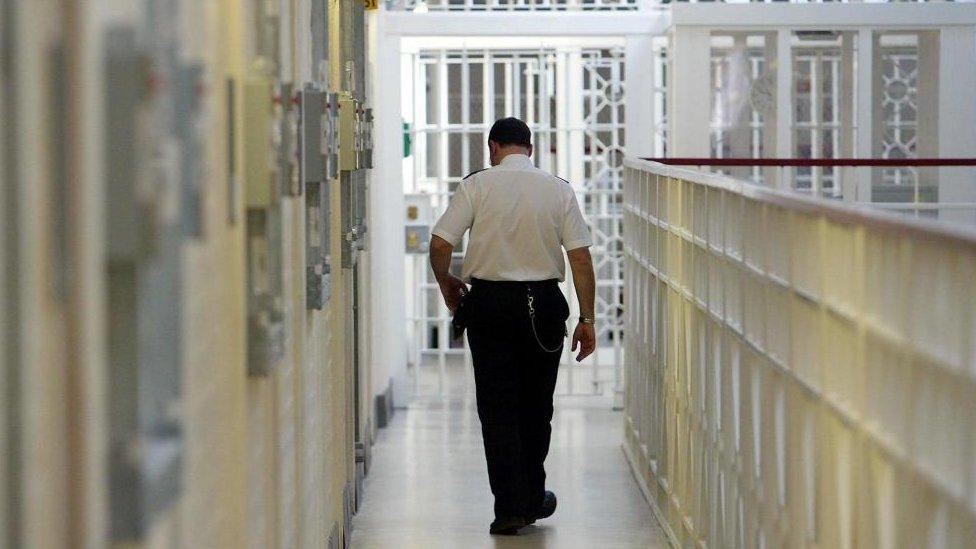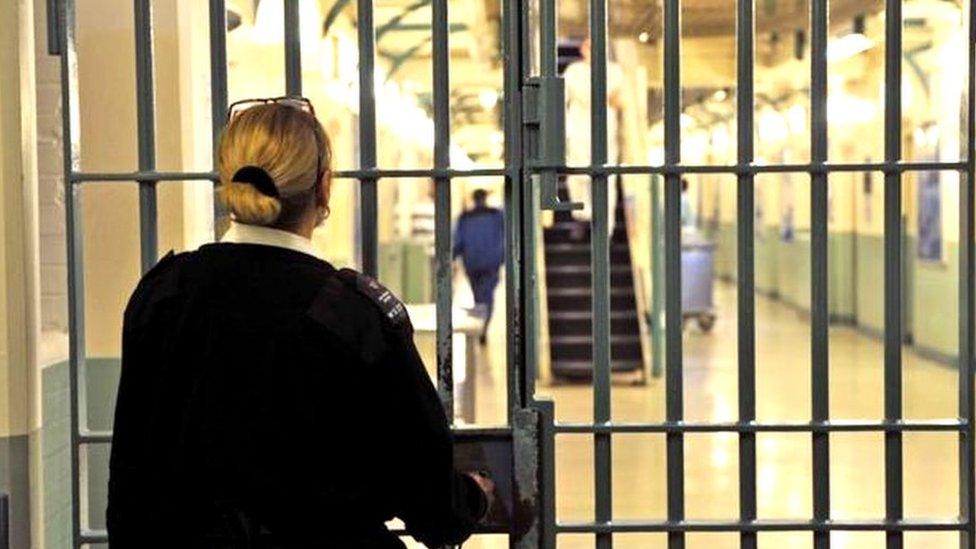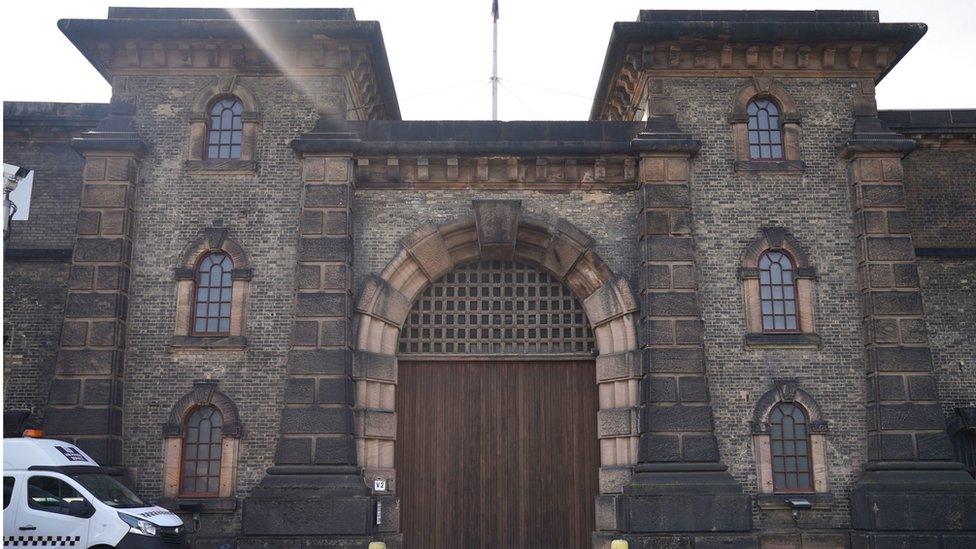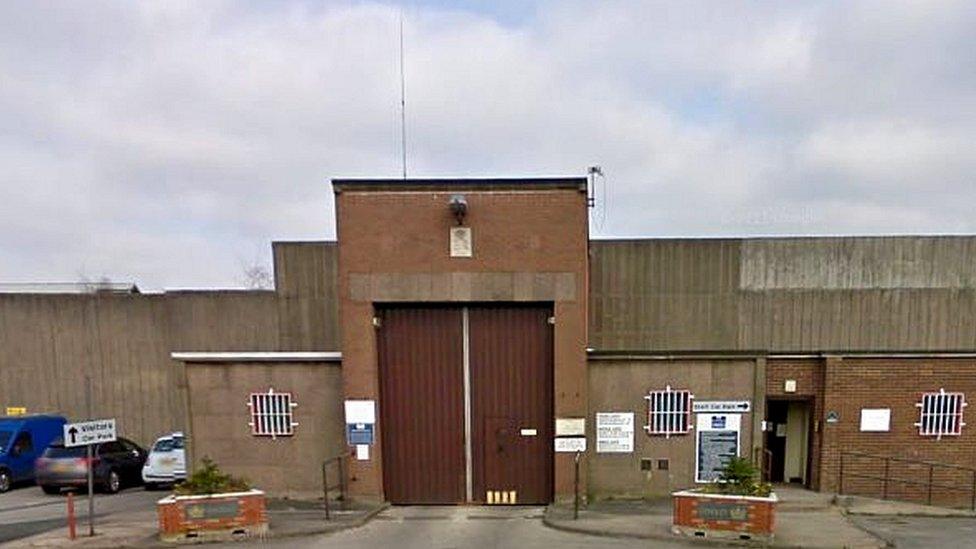Court cases delayed after pressure on prison places
- Published

Ministers have triggered a plan which allows the criminal justice system to delay court cases of some suspects because of overcrowding in prisons.
The emergency measure means some suspects will be released on bail, rather than sent to a cell, because their trial will be put off.
It comes as the prime minister was questioned over the scheme allowing for the early release of some prisoners.
Rishi Sunak insisted nobody deemed a public safety threat would be eligible.
It is not clear how many suspects will be bailed under Operation Early Dawn, the plan to delay the start of some court cases now in force across England, which was triggered on Wednesday.
Officials suggest the plan will remain in place for a week.
David McNeill, the public affairs director of the Law Society, told the BBC's World at One programme that he was hearing "quite disturbing accounts" from members in courts describing the situation to delay court cases as "administrative carnage."
"We're having victims, witnesses, lawyers and defendants turning up at magistrates' courts today only to find that the case has been cancelled and delayed to some point in the future."
Tom Franklin, chief executive of the Magistrates' Association, said this confusion led to "a waste of resources, at a time when there are already large backlogs".
Operation Early Dawn is in addition to another emergency measure, originally introduced in October, under which some convicted criminals are already being released to a home curfew, to free up cells.
At PMQs on Wednesday, Labour leader Sir Keir Starmer asked for a guarantee from the government that no criminals considered high risk, including domestic abusers, were freed early as part of this scheme.
He pointed to an example of one inmate who posed a danger to children, who had his release date brought forward - a case that was revealed in a new report by the prison's watchdog., external
In response, Mr Sunak said: "There are strict eligibility criteria in place, with exclusions based on public safety and no-one will be put on the scheme if they were deemed a threat to public safety."
Labour also called on the government to release information about the number of people released so far under the scheme and what their crimes were.
A spokesperson for the party said it would scrap the early release system but was "under no illusion" this could be done immediately if Labour won the general election.
The plan to delay sending some cases to court emerged on Tuesday evening when criminal solicitors were informed by officials of the plans. The Ministry of Justice only confirmed the scheme publicly on Wednesday morning.
When police and the Crown Prosecution Service charge a suspect with an offence, and they conclude the individual may need to be held on remand before a trial, the case is sent as quickly as possible to a magistrates' court.
That court then decides whether or not to remand the individual to a prison while the trial is being prepared.
In practice, this means some defendants who would expect to be sent from court to a remand prison cell will be told the start of their case is being delayed. That will mean police will have to release some of them on bail with a date to later attend court.
The prison population has ballooned in recent decades as a result of tougher sentences and court backlogs.
Government officials say the pandemic is partly to blame, because it led to an increase in the number of people being held in prisons for longer, awaiting jury trial.
On Tuesday, Justice Secretary Alex Chalk told MPs there were currently nearly 16,000 people in custody awaiting trial and "plainly that has an impact".
Under Operation Early Dawn, the Ministry of Justice says that it now needs to control the flow of cases reaching this first day in court because of the pressure on cells.
In a briefing sent to criminal solicitors, officials said their aim was to prioritise which defendants are dealt with.
Using this mechanism is not unprecedented, but it is acknowledged by those in government to be a significant move in response to a difficult situation.
Early Dawn was first implemented in March in north-west England before officials concluded this week that it had to be extended to the whole country.
Late notification
A Ministry of Justice spokesman admitted magistrates and police were notified late last night due to extreme pressure on the prison system.
He told the BBC: "To manage this demand we have brought on thousands of extra places at pace and will introduce strategic oversight of the transfer of remanded offenders from police custody to magistrate courts to maintain the running of the justice system."
Shabana Mahmood MP, Labour's shadow justice secretary, said the government was "stalling justice" and "leaving victims in limbo".
Ministers have already authorised the extension of a rolling early release scheme for some offenders who are near to the end of their sentence.
The scheme will now direct the release to home curfew of some offenders up to 70 days before the end of their jail term - up from 18 days when the scheme was first introduced last October.
Separately, about 400 police station cells have been set aside to help prisons deal with overcrowding.
Law Society of England and Wales president Nick Emmerson said they had asked the Ministry of Justice for more information "to understand the full implications of this emergency measure".
"What is crystal clear is the prison spaces crisis is a consequence of the government's approach to justice including over a decade of underfunding of our criminal justice system," he said.
Additional reporting by Jennifer McKiernan
- Published14 May 2024
- Published8 May 2024

- Published9 May 2024

- Published12 March 2024
